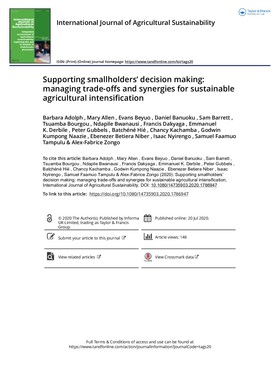Supporting smallholders’ decision making: managing trade-offs and synergies for sustainable agricultural intensification

Meeting multiple, often competing objectives when seeking to sustainably intensify their agricultural operations is a constant challenge for smallholder farmers in Sub-Saharan Africa. Trade-offs between social, economic and environmental goals at different time and spatial scales need to be reconciled, making best use of scarce resources. This study explored how different types of farm households in Northwest Ghana, Eastern Burkina Faso and Central Malawi make choices about resource allocation and farming strategies, and how they manage the trade-offs encountered. It used both quantitative (questionnaire survey) and qualitative (household case studies) methods to identify trade-offs experienced by farmers and to analyse trade-off management strategies used by them. The 10 main trade-offs identified across the 3 countries occurred across sustainability domains, across time, across spatial scales, across types of farmers or a combination of these. Famers were disincentivized from prioritizing long-term sustainability in their farming operation by resource constraints to meet multiple farming and livelihood objectives, mainstream agricultural policies encouraging short-term productivity gains and adoption-focused interventions, which disregard the diversity of farming households.






